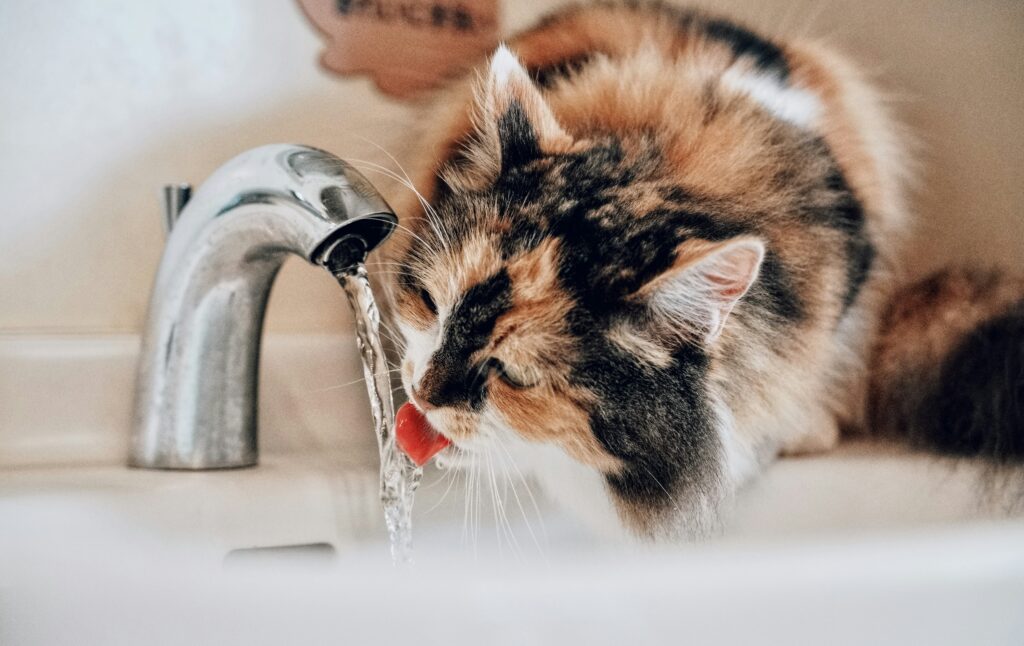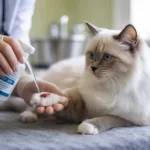
Contents
Introduction
Dehydration is a serious condition that can quickly become life-threatening for pets if not treated. Just like humans, pets need a steady supply of water to maintain their bodily functions. Whether due to vomiting, diarrhea, excessive heat, or not drinking enough water, dehydration in pets can have severe consequences if not addressed promptly.
In this blog, we’ll discuss the symptoms of severe dehydration in pets, how to recognize it early, and what to do if you suspect your pet is dehydrated. We’ll also explain when it’s time to seek emergency pet care to prevent serious complications.
Understanding Dehydration in Pets
Dehydration occurs when the body loses more fluids than it takes in. Pets can become dehydrated for a variety of reasons, including:
- Vomiting and Diarrhea: Excessive fluid loss from vomiting or diarrhea can cause dehydration, particularly if the pet is unable to replace the lost fluids by drinking water.
- Heatstroke: Pets exposed to extreme heat or prolonged physical activity in hot weather are at a high risk for dehydration.
- Lack of Access to Water: Pets may not drink enough water due to illness, stress, or being in an unfamiliar environment, leading to dehydration over time.
- Chronic Conditions: Pets with certain health conditions, such as kidney disease or diabetes, may be more prone to dehydration.
When dehydration sets in, it can lead to a range of complications, from organ failure to shock. It’s important to recognize the signs early so you can get your pet the help they need.
Recognizing the Symptoms of Severe Dehydration in Pets
Dehydration can affect pets in different ways depending on the severity. It’s important to monitor for symptoms, especially if your pet has been vomiting, having diarrhea, or exposed to heat. Common signs of severe dehydration in pets include:
- Dry Gums and Nose
One of the first signs of dehydration is a dry or sticky feeling to your pet’s gums. The gums should be moist, and if they feel dry, it may be a sign that your pet is dehydrated. Additionally, a dry nose can also indicate fluid loss. - Sunken Eyes
Dehydration can cause your pet’s eyes to appear sunken, particularly in severe cases. This is a sign that your pet is not getting enough water to maintain proper hydration levels. - Excessive Panting or Rapid Breathing
If your pet is panting excessively or breathing rapidly, especially in a calm environment, it may be a sign of dehydration. This can be especially common in pets with heatstroke or after strenuous activity. - Lethargy or Weakness
A dehydrated pet will often appear lethargic and weak. They may not have the energy to play, walk, or engage with their surroundings, which is a sign that they are in distress. - Loss of Skin Elasticity
One of the most common ways to check for dehydration in pets is to gently pull up on the skin at the back of their neck or between their shoulder blades. In a properly hydrated pet, the skin will quickly return to its normal position. In a dehydrated pet, the skin will stay tented or return slowly to its normal position, indicating a significant loss of fluids. - Increased Heart Rate or Weak Pulse
Dehydration can cause your pet’s heart rate to increase. You may notice a weak or rapid pulse, which can be a sign of circulatory failure if dehydration is left untreated. - Reduced Urination
Pets that are dehydrated may urinate less frequently, and their urine may be more concentrated or darker than usual. If your pet is producing little to no urine, it’s a serious sign of dehydration. - Vomiting or Diarrhea
If your pet has been vomiting or having diarrhea, this can quickly lead to dehydration. Pets may also continue vomiting or have diarrhea due to the lack of fluids in their system.
What to Do If Your Pet Is Severely Dehydrated
If you notice the signs of severe dehydration in your pet, it’s important to act quickly to prevent further health complications. Here are the steps you can take to manage the situation:
- Contact Your Emergency Vet
If your pet is showing signs of severe dehydration, contact your vet or an emergency pet clinic immediately. Dehydration can lead to serious health issues, and prompt treatment is crucial. If your vet is unavailable, find a nearby emergency pet clinic that can help. - Provide Fresh Water
If your pet is alert and able to drink, provide them with fresh water in small sips. Avoid giving them large amounts at once, as it may cause vomiting. If your pet refuses to drink, try offering water with an electrolyte solution specifically designed for pets. - Offer Ice Cubes or Ice Chips
If your pet is hesitant to drink, try offering ice cubes or ice chips. This can encourage them to hydrate without overwhelming their stomach. Some pets may find it easier to lick ice rather than drinking from a bowl. - Cool Your Pet Down (If Heatstroke Is a Concern)
If your pet is dehydrated due to heatstroke, it’s crucial to cool them down. Move them to a shaded, cool area and offer water. You can also use a cool, damp cloth to wipe their paws, ears, and belly to help lower their body temperature. - Keep Your Pet Calm
If your pet is weak or lethargic, make sure they are in a calm, quiet environment where they can rest. Try to avoid any activity that could cause additional stress or strain, which could worsen their dehydration.
When to Seek Emergency Care
Dehydration can quickly become a life-threatening condition, especially if your pet is experiencing severe dehydration. Seek immediate veterinary care if:
- Your pet’s gums are dry and sticky, and their eyes appear sunken.
- They are excessively panting or struggling to breathe.
- Their skin remains tented after being pulled up.
- They are lethargic, weak, or unresponsive.
- They are not urinating or producing little to no urine.
- They have been vomiting or having diarrhea for more than a few hours.
- You cannot get your pet to drink water or provide hydration.
These are all signs that your pet needs immediate attention from a veterinarian. North MS Pet Emergency is here to provide urgent care for pets, especially in critical situations like dehydration, ensuring your pet gets the fluids and care they need to recover.
Preventing Dehydration in Pets
While it’s important to know how to respond to severe dehydration, the best approach is to prevent it from happening in the first place. Here are some tips to help prevent dehydration in your pet:
- Ensure Access to Clean Water: Always provide fresh water for your pet. If you’re traveling, bring water from home to avoid introducing unfamiliar water sources.
- Avoid Excessive Heat: Keep pets in cool environments during hot weather. Limit outdoor activities during the hottest parts of the day.
- Monitor for Illness: If your pet is vomiting or has diarrhea, take action immediately to prevent dehydration by offering fluids and seeking veterinary care if necessary.
- Provide a Balanced Diet: Make sure your pet’s food contains the necessary moisture content, especially for pets on dry food diets. Wet food or adding water to dry food can help keep your pet hydrated.
Conclusion
Dehydration in pets is a serious condition that requires prompt attention. Recognizing the symptoms of severe dehydration and acting quickly can prevent further health complications, including organ failure or shock. Whether it’s due to heatstroke, illness, or vomiting and diarrhea, always take immediate steps to rehydrate your pet and contact an emergency vet if needed.
At North MS Pet Emergency, we are always ready to provide expert care during pet health emergencies, including dehydration. Our team is here to help your pet recover quickly and get back to their happy, healthy self.Contact Us Now for immediate care, or visit us for urgent pet care after hours.





Comments are closed.